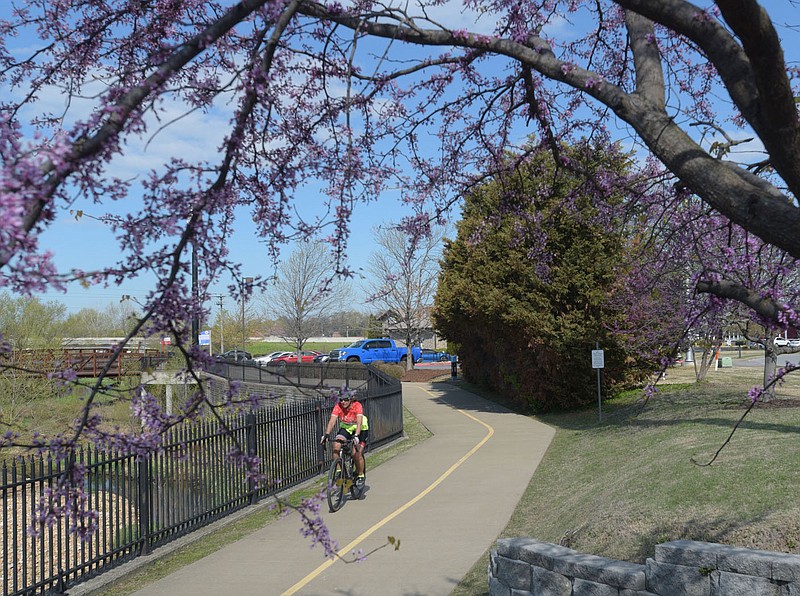Among many good books about city planning, "How Cities Work" by journalist and urban designer Alex Marshall is tops. He writes in his introduction that "the structure of a human settlement rests on a three-legged stool of politics, economics and transportation." Like virtually every other stateside analysis of cities, the book slams America's automobile culture.
Noting that how we get around determines how we live, Marshall chronicles how cars and highways have hollowed out our great cities while facilitating the disconnected cultural wastelands Americans are pleased to call "the suburbs."
Although Northwest Arkansas sold out long ago to car-centric growth, there have been recent signs of intelligent life in these parts. I have watched Northwest Arkansas' bikeways since about 1970 when I began bicycle commuting to the University of Arkansas. This region was long a cycler's no-man's-land. Only cars counted as "transportation." There was nearly zero support for alternative transportation, leading inevitably to our current mess of far-flung suburbs, congestion-strangled cities and perennial parking problems despite enormous buildings and many acres devoted merely to storing automobiles.
In 2001, a new mayor came to Fayetteville. Dan Coody was armed with a "new urbanism" outlook that was open to ideas such as Marshall's. Over the outraged cries of some who argued that bicycles are only for children, Fayetteville's first bicycle lanes were added to a few streets. The resistance was deeply American: Just as cowboys rode horses, real men drove automobiles. The next eight years saw the beginnings of Northwest Arkansas' cycling network.
Mayor Lioneld Jordan took office in 2009 and admirably expanded this policy. Today, thanks to these two gentlemen's leadership and to assistance from the Walton Family Foundation, all of Northwest Arkansas benefits enormously from our trails. We have become a nationally recognized bicycling mecca, our citizens are happier and healthier, and the crippling costs of the automobile are reduced.
But when I wait amidst car congestion at the corner of Lafayette Street and North College Avenue every evening while bicycling home from work, I see lanes in all four directions endlessly filled with cars, many transporting only the driver. What's wrong? For anybody with eyes to see, one ingredient is strikingly absent. Alex Marshall would call it the crucial ingredient: mass transit.
What are we thinking? Northwest Arkansas cities will continue granting an OK to sprawling suburbs, and as they do the crush on commuter roads can only increase. Wouldn't it make more sense to carry, say, 40 people in one bus rather than in 40 cars? Are we so fearful of our fellow Americans that each of us must have a private little box to drive to work?
The University of Arkansas could help considerably by not enabling car dependence. Many colleges prohibit undergraduates from parking on or near the campus. Students who drive in from distant towns should park off-campus and get on a bus.
Wonderful plans for rail and bus transit have been discussed for decades but not implemented. Northwest Arkansas' layout of cities is perfect for regional commuter rail. A thick network of buses including bus rapid transit has been discussed. Yet today there is no passenger rail service and sparse bus service.
Northwest Arkansas has plenty of wherewithal to handle this problem. It's in the interest of Tyson, Walmart, J.B. Hunt, the University of Arkansas and others to facilitate efficient and humane transportation that would, for example, make it easier for suburban families to do without that second car and for people without a car to commute to Northwest Arkansas Community College.
Ozark Regional Transit has recently announced plans to go to the voters with a request for a quarter-cent sales tax to support an expanded bus system. Although I'd rather the money came from property taxes, I would certainly support such a sales tax. Ideally, the money should come from gasoline taxes because drivers will benefit in two ways: First, they can switch from cars to mass transit, saving money by, for example, ditching their second car. Second, a widely used mass transit system reduces road and parking congestion.
ORT Executive Director Joel Gardner says the requested expansion is needed now because the bus system is at capacity and it will be difficult to catch up if buses begin running short. I hope Gardner and his Connect NWA Steering Committee will think big, including cooperation with Razorback Transit, and regional bus rapid transit from Greenland to Bella Vista along Highway 71.
Support the tax! It's time for Northwest Arkansas to attain the success in mass transit that it has achieved in bicycling.

